- How Much Weight Can You Realistically Lose in 3 Months? - January 14, 2024
- How To Lose 1kg a Week (Guaranteed) - August 20, 2023
- How To Count Calories (or Estimate) and Stay on Track When Eating Out at Restaurants - July 25, 2023
To gain muscle while limiting fat gain as much as possible, you’ll want a calorie surplus of around 49 calories per day. This may sound like a small amount (it is) but any more than that is likely to result in unnecessary fat gain.
WHAT IS A CALORIE SURPLUS?
A calorie surplus refers to a state when you’re ingesting more calories than you expend over a given time period. You could be in a calorie deficit over the course of an hour, day, week, or month. If you’re in enough of a calorie surplus, for a long enough period of time, you’ll gain weight.
How do you know if you’re in a caloric surplus? If the scales go up over a significant period of time, let’s say a minimum of two weeks, then you can be pretty sure your calorie intake over that period of time has exceeded the number of calories you’ve used.
Why do we need to look at longer periods of time? Well, because acute changes in weight (i.e. from one day to the next) can be caused by a ton of different things such as the amount of food in your gut/bowl (when did you last eat a big meal or go for a dump?), and the type of foods you’ve eaten (high carb and/or salty foods can retain water).
If your weight goes up by 1kg from Tuesday to Wednesday, that DOESN’T mean you’ve gained a kg of fat (or muscle, as cool as that would be).
CALORIE SURPLUS EXAMPLE
Let’s say you need 2,000 calories per day just to maintain your body weight.
Given that 1kg of body fat contains approximately 7,700 calories (1lb of body fat contains approximately 3,500 calories), you’d need to eat 7,700 OVER your maintenance in order to gain a kilo of fat.
So, if you ate 9,700 calories in one day, you could technically gain a kilo of bodyweight over the course of roughly 24 hours.

WHY THAT PROBABLY WOULDN’T HAPPEN
Although that level of weight gain COULD happen, it’s unlikely to.
Why?
Calories in vs calories out has some complications; the amount of calories you take in affects the number of calories you burn.
No, your metabolism (BMR) doesn’t magically speed up, but you are more likely to move around more, whether that’s through NEAT (Non-Activity Exercise Thermogensis) like fidgeting or subconsciously getting up and walking around more, or through formal exercise like running or weight training – eating more will give you more energy, therefore making it more likely that you’ll exercise (whether that;s out of guilt, or just because you have a ton of energy to do so, where you wouldn’t have before)
Also, if you’ve taken in more protein than usual, the thermic effect of food will go up. The thermic effect of food is the process of digestion actually burning calories. That’s right – you burn calories simply by eating food. But here’s the clincher – you burn a LOT more calories eating protein than you do carbs or fat.
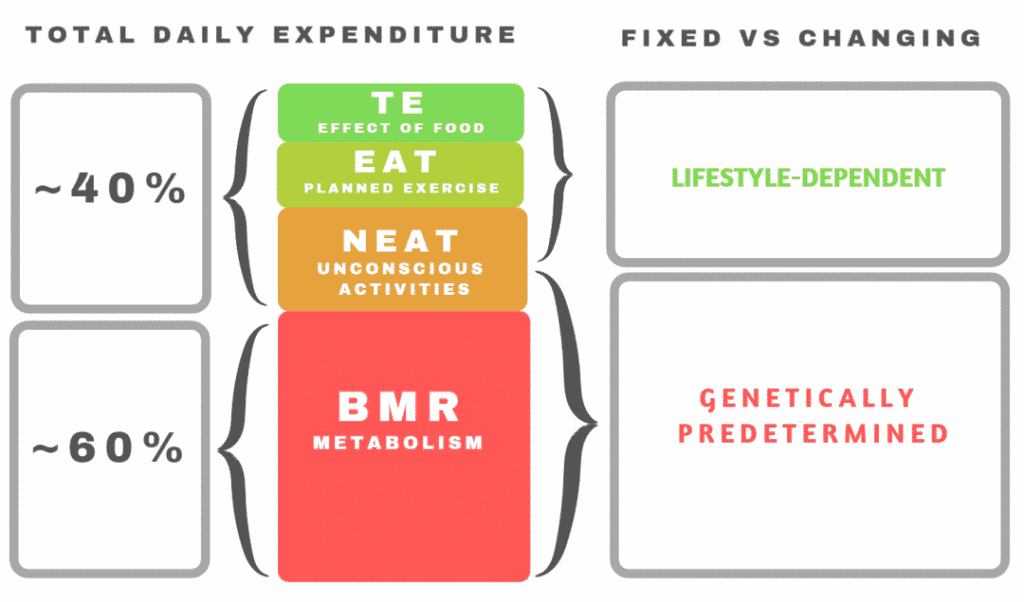
So, it’s unlikely all of those 7,700 extra calories will be stored, meaning you probably won’t gain exactly one kilo of bodyweight.
But most people don’t eat enough to gain a kilo in a day, or even a week.
Weight gain is usually much slower, which is why people don’t notice it being an issue before it’s too late.
To gain a pound of body weight in a month, you’d only need to eat 257 calories above maintenance (in theory).
So if we take the example of the person who maintains their weight at 2,000 calories, eating 2,257 calories per day (on average) would result in a kilo of weight gain.
And that’s VERY easy to do.
It’s roughly equal to four cups of tea a day (with milk and 2 sugars) or two cans of Coke a day.

DO YOU NEED A CALORIE SURPLUS TO BUILD MUSCLE?
No.
Multiple studies have shown that a calorie Surplus is NOT required to build muscle mass or gain strength.
For example, this 2016 study compared two groups of men in an energy deficit, one on lower protein (1.2g/Kg) and one on higher protein (2.4g/Kg). The study found;
“during a marked energy deficit, consumption of a diet containing 2.4 g protein… was more effective than consumption of a diet containing 1.2 g protein… in promoting increases in LBM and losses of fat mass when combined with a high volume of resistance and anaerobic exercise“
Longland et al.
How is this possible?
Well, you could be losing weight (fat) but gaining muscle mass
Let’s’ say in a month you lost 1kg of weight. You could have conceivably lost 1.1kg of fat but gained 0.1Kg of muscle, giving you a net overall weight loss of 1Kg.
Is this optimal?
No.
In order to maximise the amount of muscle you can gain, you’ll ideally want to be in a calorie surplus.
This will ensure you’re giving your body all the calories (and adequate protein) it needs to repair and rebuild (hopefully bigger) muscle after you break them down during resistance training.
The problem is you can only be building muscle mass at a certain rate, so if your calorie surplus is greater than what’s needed to build muscle, any additional caloric intake (over and above your maintenance AND the small additional amount you need to build muscle) will theoretically be stored as fat.
So…
HOW MUCH OF A SURPLUS SHOULD YOU USE TO BUILD MUSCLE?
You may be surprised by the answer.
Bodybuilding and bro-science folklore has in the past dictated that a surplus of ‘500’ calories per day is required to build muscle.
While there’s no doubt this would provide you with all the additional fuel your body needs to create new muscle, as mentioned previously, it’s MORE than enough, meaning you’ll likely gain fat as well.
Now, if you’re perfectly happy gaining fat, that’s fine, fill your boots.
But the majority of us want only muscle, with zero fat gain.
Even if you THINK you’re happy gaining some fat, the likelihood is that at some point you’ll want to diet it back off again, so you may as well just not gain it in the first place.
This means throwing the idea of ‘bulking’ out the window, and taking a much slower, more methodical approach to gaining muscle.
The number of calories you should eat to gain muscle should be dictated by the speed at which you can build muscle.
For beginners, this could be up to 5kg, for intermediate and advanced lifters, between 1-3kg is more realistic. Side note – if you want to know how much Muscle I built in a year, check out this other post!
The truth is, you’ll never really know how much you can gain, so it’s best to have a realistic target in mind.
Lets’ say we’re going to aim for 3kg of muscle in a year.
It takes roughly 5,940 calories to build 1kg of muscle (or 2,700 to build 1lb), so that means over a year we’d need to eat in a surplus of 49 calories per day.
Is that it?!
Yep, 49 measly calories – almost nothing.
That means that if you maintain your weight on 2,000 calories per day, you only need 2,049 per day day to build 3kg of muscle in one year.
In reality, the process of digesting and synthesizing protein is calorically expensive, so it might take more calories than that, but not a ton more.
This is exactly why blindly bulking and gaining a kilo a month is pretty pointless.
Your ‘bulking’ calories should be very similar to your maintenance calories.
Calories for Muscle Gain
If you want lean gains’, i.e. muscle mass without gaining any fat, you should only really be aiming to gain about a quarter of a Kg per month. This means your calories don’t really need to be much higher than maintenance.
WHAT IF YOU WENT ON A DREAMER BULK?
A dreamer bulk (otherwise known as a dirty bulk) is one where you’d aim to gain a ton of weight, expecting it all to be muscle.
So let’s take the previously referenced bro-science recommendation of a 500 calorie surplus per day.
That gives you a total surplus of 182,500 over the year.
Let’s take away the 17,820 calories we’d need to build our 3kg of muscle.
That leaves us with 164,680. If all these extra calories go toward fat storage we’d end up with an extra 21kg of fat (164,680/7700).
So a 500 calorie surplus gives us 3kg of muscle and 21kg of fat (in theory).
Trust me, you’re going to look a LOT worse at the end of that.
PLAN OF ACTION
I get it, you just want me to tell you how much to eat, and you’ll need to take these recommendations with a pinch of salt because there are so many variables AND everyone is different, but these should get you well on your way;
N.B. I’m assuming here that maintenance calories are 2000 per day.
| EXPERIENCE LEVEL | % INCREASE ON MAINTENANCE CALORIES | ACTUAL CALORIE GOAL |
| Beginner | 10% | 2200 |
| Intermediate | 5% | 2100 |
| Advanced | 2.5% | 2050 |
If you want to get an estimate of your maintenance calories that you can apply these % uplifts to, then download my free guide here;
FREE CALORIE MAINTENANCE GUIDE
SUMMARY
The amount of calories you eat in a surplus should be dictated by the amount of muscle you can naturally.
This is probably anywhere between 1-5kg in a year.
Eating any more than what’s required is largely pointless as it’ll just be fat (unless of course you’re happy to gain fat).
Bulking is a very slow process.
You shouldn’t be aiming to gain any more than 0.5kg per month, on the very upper end of the scale.
Tracking your weight, to ensure it’s not going up too quickly, track your protein to ensure you’re getting adequate amounts, and track your lifts to ensure that you’re implementing progressive overload.
Simple!
If you need help, get in touch.
REFERENCES
Higher compared with lower dietary protein during an energy deficit combined with intense exercise promotes greater lean mass gain and fat mass loss: a randomized trial: https://pubmed.ncbi.nlm.nih.gov/26817506/
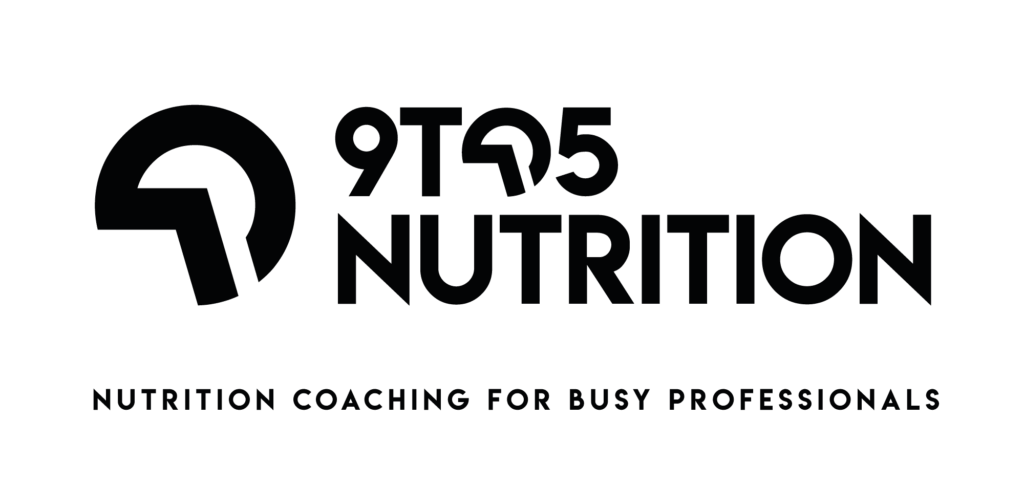
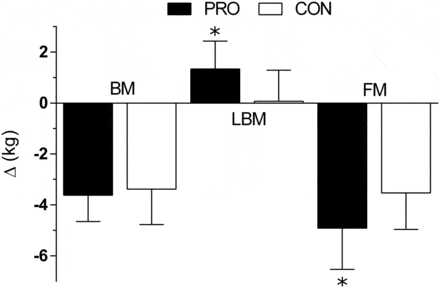

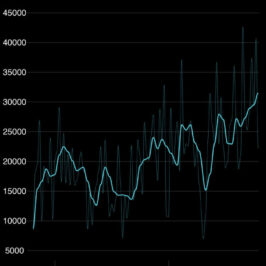


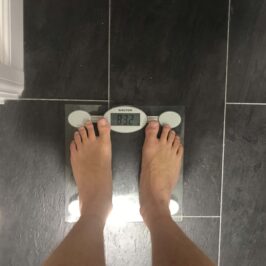
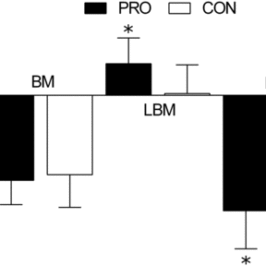
Leave a Reply